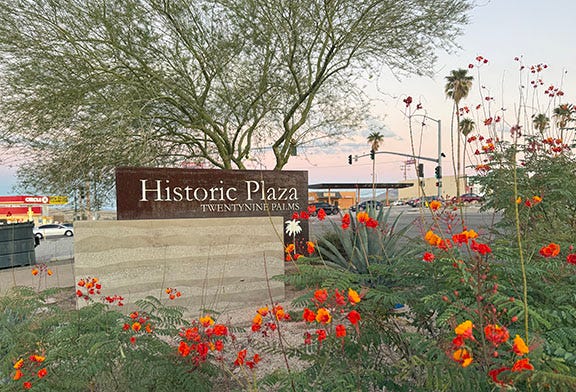On the Agenda: Twentynine Palms City Council, September 23, 2025
Routine votes could have real consequences for the community and local businesses—for better or worse

This week’s Twentynine Palms City Council meeting may look like a routine set of votes. The items tucked into the consent calendar and discussion section, however, will shape how the City manages its people, its public spaces, its tourism dollars, and its relationship with the Marine Corps base. As always, the details matter.
The 87-page agenda packet is here, and our report on the last City Council meeting is here. The meeting will take place at City Hall on Tuesday at 6 pm.
PUBLIC COMMENT
You can comment on agenda items and issues important to you at every City Council meeting. Comments on agenda items take place during discussion of that item, while comments on non-agenda items take place near the end of the meeting. The Brown Act prevents Council from commenting on non-agenda items. To comment, just pick up a form at the entry desk, fill it out, and hand it to the Clerk, who usually sits just in front of the Council bench toward the right.
Here's the list of Council email addresses to write if you can't get to the meeting — be sure to email them prior to 2 pm on the date of the meeting so they have time to read your email prior to discussion. You can also copy the clerk at cvillescas@29palms.org and ask that your letter be made part of the public record.
AWARDS, PRESENTATIONS, APPOINTMENTS AND PROCLAMATIONS
The City will recognize September as Hunger Action month. Also, a representative from San Bernardino County Transit Authority will provide an update on Measure I, a half-cent sales tax dedicated to transportation improvements. It was first approved by voters in 1989 and extended in 2004. This will be fascinating for us infrastructure geeks.
CONSENT CALENDAR
The Consent Calendar consists of routine items, usually approved with a single vote. The public is given a chance to make public comment on these items prior to the Council motion. Fill out a comment form specifying the item you wish to address and submit it in person or send an email in advance regarding any of the items on this meeting’s Consent Calendar.
Approval of the minutes of the September 9, 2025 City Council meeting
Adoption of an Ordinance, Amending Chapter 2.01, Titled “City Manager,” of the Municipal Code Changing Responsibility for Supervisory Authority Over the City Clerk from the City Council to the City Manager
At present, the City Clerk reports to the City Council. Under the new ordinance, that supervisory authority would move to the City Manager. In practice, this means the City Manager—already responsible for supervising the City’s department heads—will now also handle reviews, pay adjustments, and other personnel matters for the Clerk. The Council retains the power to appoint the Clerk, but day-to-day oversight shifts away from elected officials.
This removes the Council from the business of conducting performance reviews for the City Clerk. It also signals a trend of consolidating personnel decisions under professional management rather than elected oversight.
PUBLIC HEARING
Tourism Business Improvement District (TBID) Reauthorization for 2025-26 Fiscal Year
At the last City Council meeting, held on September 9, the Council voted unanimously to accept the TBID 2025-26 budget and reauthorize the levying of the 1.5% Transit Occupancy Tax levied on guests of hotels and short-term rentals. We took a deep dive into the budget and marketing plan here and in our recap of the meeting.
The TBID reauthorization process requires a public hearing and notification to affected businesses. You may remember that in 2023, TBID reauthorization became contentious when a vote to renew Board failed after heated public comment. But six days later at a special meeting, Council reversed themselves, voting unanimously to reauthorize the TBID for another year, after hearing promises that the TBID would reorganize and improve its performance and accountability going forward.
Last year, TBID was reauthorized unanimously, and there is every reason to think it will once again be reauthorized for the next year.
DISCUSSION AND POTENTIAL ACTION ITEMS
Historic Plaza Conditional Use Permit
The Historic Plaza, at Adobe and Two Mile, is Twentynine Palms’ original commercial core, and increasingly, a gathering space. In the past year, the Friends of the Historic Plaza have organized multiple community events in its parking lot. Those have been popular, but technically, City Code allows only four such events annually unless a Conditional Use Permit (CUP) is in place.

Because the City owns the parking lot and drive aisles, the Plaza’s events are subject to CUP requirements normally applied to private landowners. Filing for a CUP costs about $5,000—a steep price for a volunteer group organizing free family-friendly festivals. The Council will consider whether to waive the fee and allow the application to proceed.
This decision speaks to how Twentynine Palms chooses to nurture grassroots cultural activity. Waiving the fee would be a recognition that the Historic Plaza functions as civic infrastructure, even if it is not formally designated as a City facility like Freedom Plaza. Refusing could constrain community use of a space already proving itself as a hub, which is critical in a city short of public spaces.
Marine Corps Air Ground Combat Center (MCAGCC) Category C Waiver Request
An item added after the release of the initial agenda could have a significant impact on Twentynine Palms businesses and residents. Since 9/11, public access to the Marine Corps Air Ground Combat Center has been sharply curtailed. Residents lost entry to recreational amenities and on-base businesses; base operators lost the civilian customers who once supported them. Now, the Base is seeking a Category C Waiver that would allow vetted civilians to once again access certain facilities.

Category C facilities are those deemed “revenue-generating” with excess capacity: the movie theater, bowling center, golf course, chain restaurants like Qdoba and Popeye’s, and various clubs. Under the waiver, civilians could apply for a Defense Biometric Identification System card—requiring REAL ID and a background check—to patronize these spots. Military personnel would always have priority.
Access to the Base ties directly into the five-year strategic plan, which includes a stated goal of strengthening partnerships with the Marine Corps and leveraging opportunities for mutual benefit. Increased civilian access could mean increased competition for local off-Base businesses, but it could also provide new sales tax revenue for the City (according to the Staff Report) along with a stronger sense of connection between the civilian and military communities. It could also generate debate about equity—who qualifies for access and how transparent the vetting process will be.
A Marine Corps representative is scheduled to attend Tuesday’s meeting to field questions. The Council is expected to decide whether to issue a letter of support for the waiver request. It’s not binding on the Commandant of the Marine Corps, but local backing could carry weight.
Leave your thoughts in the comments below. Please note that we do not allow anonymous comments. Please be sure your first and last name is on your profile prior to commenting. Anonymous comments will be deleted.
Feel free to share this article!
Help us reach our 2025 goal of $10,000 in subscriptions! Upgrade to a paid subscription for just $5 per month or $50 per year.
Would you care to donate more than $100? Our Paypal account is up and running!

